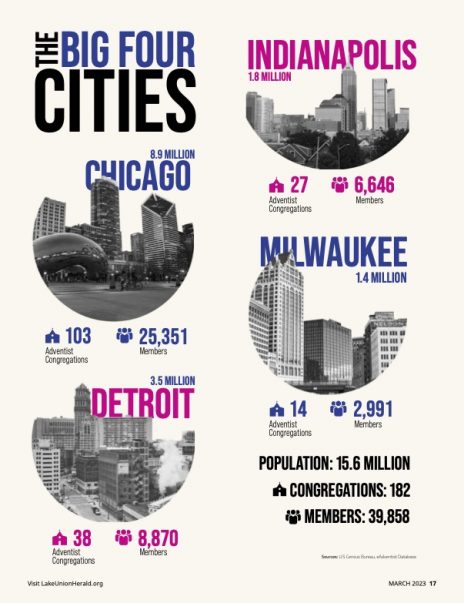
Source: Pexels
I love the city. Perhaps it is the familiar childhood memories: crowded streets, alleys in the neighborhood, chasing or being chased by other boys on sidewalks, chatter and sounds from a corner bus stop, parks, bright lights, businesses beckoning shoppers and diners, the inviting odor of ethnic foods, and the sounds of iron security gates dropping to secure storefronts. The city.
The city is many things. A place where young professionals launch careers, where technology, service, creativity or art offer opportunity. For immigrants the city is a place to seek a better life among others like themselves. For some in underserved neighborhoods it is a place of challenge, hopefully to improve their situation and future. For retirees the city is a welcoming place of culture and community. Casual observers can be deceived by the city; merely thinking of it as unsafe, unclean or dominated by crime and violence.
Regardless of how we view the city, political and economic power continue to shift from rural communities to the city. Here creativity and technology are centered, ideas are pursued, investments made, and social policy formed. Here diverse neighborhoods present their own particular mission and ministry challenge, and wealthy professionals in pricey condos, high-rise apartments and restored brownstones comprise arguably the single most unreached people group in North America.
We in the church often sound the call to evangelize the city. Honest reflection will acknowledge that attitudes toward the city shape the ways rural or suburban congregations approach that calling. Many prefer to evangelize from a distance. Or we keep doing ministry the way it has been done in the different contexts of the small town, the countryside or the suburb.
What does mission and evangelism in the city look like? My life experience, ministry journey and research opportunities have delivered many inspiring cases of successful urban ministry. I will never forget one such moment working in an urban garden in the heart of Chicago. Teens and young adults from underserved and privileged neighborhoods worked alongside each other. Each experiencing new vision and direction in their lives. During a break I asked the 30-something-young-adult leading the volunteers with whom I had become acquainted (from a wealthy heart-of-the-city neighborhood!) if she still attended the church she grew up in. She looked at me with a tone that said “listen carefully.” Having secured my attention she motioned to the urban garden and those working alongside her as she firmly stated, “This is church.”
Mission looks like that day when I was working with a street ministry in Phoenix. They provided “pop-up meal and worship” in various locations downtown. He was a young adult in his late 20s who had escaped from a dysfunctional family in Los Angeles as a teen, gotten into drugs and theft, avoided arrest, and eventually accepted an invitation to transitional housing from the ministry organization he now serves with. Rehabbed and transformed, he leads worship at one of the sites. Finishing a meal together at the housing facility the ministry provides, I commented that their ministry gives people a second chance. I got that look again. An invitation to stop, listen and understand. “No,” he replied, “not a second chance. Another chance. There is no end to God’s grace.”
Mission looks like a conversation with a graduate student of Boston University who had found faith at Park Street Church in Boston. I had listened to the stories of others in that historic congregation’s life. People who found Christ while expressing themselves in various forms of art in public spaces sponsored by the church and its small groups. She described her transformation as openness to her art, and the willingness the small group had shown to not judge her.
Mission looks like the pastor serving in Toronto. She initiated a ministry to women who spend evenings on the streets. She describes the abuse, family dysfunction or emotional disorder those women emerge from. So church women took to the streets in pairs with small white sacks of needed things, kind words, and a cup of coffee to warm those whose income was being earned on the streets. Relationships led to daytime activities, and eventually a week-long summer camp. No men allowed, led by the women from the streets, including devotions and Bible study! I asked about conversions to Christ, or stories of transformation. I got that look again. She turned her desktop monitor toward me and clicked on a video of the baptism from the previous summer at the camp. Wow. “How many?” I asked. Remember, I am a former conference administrator! She replied with a smile, “I stopped counting a few years ago at 200.”
Mission looks like the worship service at Reality Church in the dynamic heart of London. Young professionals, successful, of Eurocentric ancestry, joined in their church plant. First drawn to community by weeknight urban forums on issues like moral philosophy, artificial intelligence, creativity — topics of interest to the secular mind. Now they gather in small groups for conversations examining reason and philosophy. They come together weekly for corporate worship and teaching. They started small, and now number around 300. I asked one why they came to church that morning. “We explore ideas, we can ask questions, we study Scripture, meaning. I really appreciate that.” “Well,” I said, “This is not a typical church.”
I could go on. Moved as a woman transformed by the service of a pregnancy center tells her story while her child plays nearby. Inspired by the hope a young man expresses in the services of a legal clinic. Surprised by the devotion of gang members who learned of Christ in a neighborhood intramural league. Impressed by the young teen living in an impoverished neighborhood crediting the urban ministry group she now works with for her life vision and hope. Hearing a business owner thank the finance service of the church for his start. People now enjoying healthy lives thanks to an urban wellness center, friendships formed at block parties, skills a single mother learned at her transitional housing development. These are people whose lives have changed.

It begins with relationships. God is relational. He came and lived among us. Evangelism in the city is relational, meaning we live in the city. We know people, we invite them into our homes, we are in the parks, museums, concerts, restaurants and shops. We are on the bus and subway car. Living, working, talking together. And without judging, preaching or condemning.
Mission will engage unconditional service. Such things as urban garden spaces, joining struggles for social and economic justice, pastoral care, education, social connections or delivery of human services. Service transforms the nature of relationships and moves forward to community. Urban people, especially those living in wealthier neighborhoods, are suspicious of organized religious institutions. But they do find meaning in unconditional service.
Mission will involve a patient process of forming community. We will build community in the process of relationship and service, trusting the Holy Spirit to form understandings of God and Christian living. For those who are less familiar with the worldview of urban culture, this process may be a confusing departure from traditional evangelism centered in doctrinal teaching. To put it simply, relationships and service lead to Christian community and transformation. Beliefs form and transformation happens. But not before relationship, service and community are experienced.
Mission summons authentic spirituality, not simply people who are friends, who serve, who meet in community, or believe certain things. In secular culture where reason prevails and subjective moral reasoning forms the basis for sense-making, spirituality is an essential perspective in the process of Christian discipleship. The challenge for the church is to live out this tension relationally, with persuasion, and with a caring respectful spirit.
When spirituality forms, both personal and corporate worship is an appropriate and subsequent response. Although worship is expressed in words and in music, in the context of the experience of a person in the city the expressions become artificial if they are merely the prior traditions of the church.
Mission transforms! It does take time. Patiently trusting the Holy Spirit to transform lives through relationship, service, community and dialogue can be difficult for the organized church when quick visible results are an expectation and affirming to our faith.
Can we change? Will we make disciples in the city — live in urban space, serve, experience community, listen and learn together? Change together? Our answer is essential to the life and future of the church. Whether we live in suburbs, small towns, the country or the city our destinies are inextricably linked. Understanding the challenge, affirming those who do live and serve in the city, and looking for opportunities to resource urban ministries is a shared purpose.
Reflect on the words of Jeremiah, with some exegetical liberty: “Seek the well-being of the city ... for in its well-being you will find your own well-being” (Jeremiah 29:7). That message is still God’s word for the church today.
Skip Bell, DMin, is emeritus professor of leadership at the Seventh-day Adventist Theological Seminary and leads the urban ministry concentration in the Doctor of Ministry program. Bell has authored “A Time to Serve: Church Leadership for the 21st Century,” is the editor and primary contributor for “Servants and Friends: A Biblical Theology of Leadership,” and the author of “Christ in the City: Six Essentials of Transformational Evangelism in the City Center.”